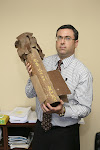JERUSALEM — Blaming Israel for the problems of the Middle East or demanding boycotts against the Jewish state are nothing more than a modern form of anti-Semitism, says Prime Minister Stephen Harper.
Harper made the remarks to the Knesset, becoming the first Canadian prime minister ever to speak directly to the assembled members of the Israeli parliament.
But while the speech drew plenty of sustained applause, at least one Arab member briefly tried to shout Harper down before angrily storming out of the chamber when the prime minister spoke of what he called “the twisted logic” of calling Israel an apartheid state.
Harper looked into history, touching on the Holocaust and Canada’s own refusal in the 1930s to help Jewish refugees, which he called a terrible mistake.
He spoke of the foundation of Israel as a place where people could “seek shelter from the shadow of the worst racist experiment in history.”
And he said the crude bigotry of old has been recast “into more sophisticated language for use in polite society.”
“We have witnessed, in recent years, the mutation of the old disease of anti-Semitism and the emergence of a new strain,” Harper said.
He said criticism of Israeli government policy isn’t anti-Semitic, but criticism which only targets Israel while ignoring violence and oppression in its neighbours is unacceptable.
“It is, thus, a Canadian tradition to stand for what is principled and just, regardless of whether it is convenient or popular,” Harper said. “But, I would argue, support today for the Jewish state of Israel is more than a moral imperative. It is also of strategic importance, also a matter of our own, long-term interests.”
Harper said the forces that have threatened Israel “every single day of its existence” threaten all countries, “as 9-11 graphically showed us.”
The prime minister said he refuses to single out Israel for criticism, saying it is easy to follow the international crowd and focus only on that one country — a “go-along-to-get-along” approach he described as both weak and wrong.
Harper said Canada holds that Israel’s right to exist as a Jewish state is absolute and that it would be quick to welcome a new sovereign Palestinian state if its leaders choose democracy and peace.
“Just as we unequivocally support Israel’s right of self-defence, so too Canada has long supported a just and secure future for the Palestinian people,” Harper said
“And, I believe, we share with Israel a sincere hope that the Palestinian people and their leaders will choose a viable, democratic, Palestinian state, committed to living peacefully alongside the Jewish state of Israel.”
Harper also pledged solidarity with Israel on Iran, saying it will keep sanctions in place and steadfastly work to oppose Tehran’s pursuit of a nuclear weapon.
“We truly hope that it is possible to walk the Iranian government back from taking the irreversible step of manufacturing nuclear weapons,” he said.
“But, for now, Canada’s own sanctions will remain fully in place and should our hopes not be realized, should the present agreement prove ephemeral, Canada will be a strong voice for renewed sanctions.”
That promise drew one of the loudest and longest of several standing ovations from the assembled members.
Earlier in the day, Harper met the president of the Palestinian Authority, offering $66 million in new aid for the Palestinians.
Under heavy security in the West Bank city of Ramallah, Harper and Mahmoud Abbas met for about a half-hour at the presidential palace before appearing at a joint news conference.
Relations between the two have been strained since the Conservative government attempted to block a bid by the Palestinians for observer-state status at the United Nations last year.
On Monday, as Palestinian officials and some Canadian cabinet ministers looked on, the prime minister disputed suggestions that his stance on the conflict between Israel and Palestine is pro-Israeli.
Instead, he said, his position is a Canadian one, adding he favours a two-state solution in which Israel can thrive in peace and security alongside a Palestinian state.
But, foreshadowing his Knesset speech, he added forcefully, he would not be drawn into chiding Israel.
He also denied reports in some Israeli media that he’s been asked to absorb Palestinian refugees as part of a comprehensive peace settlement in the Middle East. The prime minister said Canada hasn’t been asked to take any refugees.
Abbas, meantime, said Canada is entitled to its opinion on the conflict between Israelis and Palestinians but made clear he wants an open dialogue with his Canadian counterparts.
The Conservative government says the new aid money will help advance the peace process, promote security and deliver humanitarian assistance. In a release announcing the aid, the Conservatives said Canada has provided more than $650 million in assistance to the West Bank and Gaza since 1993.
While the new funds are on top of $30 million announced last November, it still isn’t as high as previous levels of funding to the Palestinians.
Harper made the trip to Ramallah after visiting the Church of the Nativity in Bethlehem, considered by many to be the birthplace of Christ.

